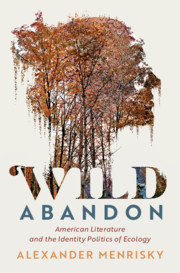Book contents
- Wild Abandon
- Cambridge Studies in American Literature and Culture
- Wild Abandon
- Copyright page
- Contents
- Acknowledgments
- Introduction Modern Environmentalism’s Identity Politics
- Chapter 1 The Ecological Alternative
- Chapter 2 The Entheogenic Landscape
- Chapter 3 The Universal Wilderness
- Chapter 4 The Essential Ecosystem
- Chapter 5 The Death of the Supertramp
- Conclusion Ecological Consistency
- Notes
- Bibliography
- Index
- Recent Books in This Series (continued from page ii)
Chapter 5 - The Death of the Supertramp
Psychoanalytic Narratives and American Wilderness
Published online by Cambridge University Press: 26 November 2020
- Wild Abandon
- Cambridge Studies in American Literature and Culture
- Wild Abandon
- Copyright page
- Contents
- Acknowledgments
- Introduction Modern Environmentalism’s Identity Politics
- Chapter 1 The Ecological Alternative
- Chapter 2 The Entheogenic Landscape
- Chapter 3 The Universal Wilderness
- Chapter 4 The Essential Ecosystem
- Chapter 5 The Death of the Supertramp
- Conclusion Ecological Consistency
- Notes
- Bibliography
- Index
- Recent Books in This Series (continued from page ii)
Summary
“The Death of the Supertramp” examines the extent to which psychoanalytic concepts inform contemporary expressions of the American wilderness myth. It does so by focusing on the much-publicized death of Christopher McCandless, the subject of Jon Krakauer’s Into the Wild (1996), as well as his cult following. McCandless takes to an extreme an idea popular within the deep ecology movement: that by quitting human civilization one might recover a repressed, authentic sense of wholeness. McCandless equates this lost unity with the expansive scope of the ecosystem as a whole rather than a bounded sense of self. Krakauer’s account demonstrates the centrality of Freud’s developmental schema to the young man’s logic: McCandless believes that his civilized ego represses a natural, more expansive psychic condition. It also suggests that this influence introduces a certain political quiescence to both wilderness discourse and mainstream environmentalism in general. In dismissing the importance of his self-identity – the ego that gives him reason to stay alive – McCandless does the most authentically ecological thing possible: he dies, consequently allowing his bodily matter to circulate.
Keywords
- Type
- Chapter
- Information
- Wild AbandonAmerican Literature and the Identity Politics of Ecology, pp. 170 - 198Publisher: Cambridge University PressPrint publication year: 2020

